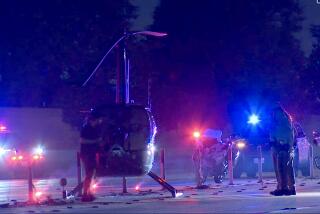WOODLAND HILLS : Driver’s Seeing Red Over Slow On-Ramp Meter
- Share via
“Mommmmmmm! I’m gonna be late for school,” whines the 11-year-old son of devoted mother, office worker and exasperated commuter Toni Slee of Woodland Hills.
At the moment, she is entrapped in the family car and stuck in a mire of motionless cars, all funneling toward the southbound on-ramp to the Ventura Freeway at Winnetka Avenue.
“Mommmmmmm, come on,” that pre-pubescent voice keeps demanding. Slee looks at the clock: It is 7:35 a.m., and she and other drivers have been waiting in line for eight minutes now to make it onto the freeway.
They are all at the mercy of the traffic signal at the top of the ramp, the one that seems to take forever to turn from red to green, one car at a time only, please.
This has been Slee’s daily routine, but she is not going to take it anymore.
In June, Slee filed complaints about the signal with Caltrans, the engineer who works for the agency, and the city of Los Angeles. A week later, Slee said, the Winnetka Avenue meter was turned off.
Traffic improved considerably. But not for long.
Six weeks later, the meter was on again. Slee discovered it had only been disarmed temporarily for repairs. Her letters hadn’t shut down the hateful thing; it was just coincidence.
Caltrans spokesman Rick Holland said the Winnetka Avenue signal could indeed be slower than other signals in the city. “The timing is determined by the traffic flow. . . . Once the traffic gets heavier the light speeds up,” said Holland. “It’s mostly done with sensors.”
He didn’t rule out the possibility that the Winnetka sensor may be broken.
Slee noted that not only is the entry process slow, commuters are often left stranded in the middle of the intersection when the signal light turns red.
“Then there are those people who get sick of waiting and take the car-pool lane,” Slee said, even though they are not carrying any passengers. “I know that if I even started to think of getting in the car-pool lane, the police would see me.”
A ticket would set her back nearly $300.
More to Read
Sign up for Essential California
The most important California stories and recommendations in your inbox every morning.
You may occasionally receive promotional content from the Los Angeles Times.










